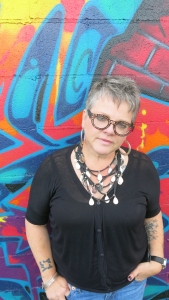Preparing for a Writing Life – Ann Dávila Cardinal
I had a revelation about our MFA in Writing for Children & Young Adults program this summer. An honest to goodness revelation.
A question I’m often asked is “does the program teach you about the business of writing?” A perfectly understandable question given that few of us write with the intention of having our work stay on our computer forever.

But the way I figure it, the business end of the craft is kind of like childbirth: if you could really understand what the process was like, really understand, the human race would be doomed. No, our faculty teaches that the best way to be successful in the business is to be the strongest writer you can be.
But this summer, as I was waiting for my editorial letter on the first book I’ve published in 12 years, I was nervous. Would my editor want it all changed? Would she finally say, “Sorry, Ann. We made a mistake. You really suck and your book was bought because of a glitch in the publishing matrix. Have you considered becoming an accountant?”
My friend Cori McCarthy said, “No, don’t worry. It’s like a packet and a half.”
I responded incredulously, “Seriously?”
Cori assured me, yes.
I started breathing easier.
When it arrived, my editor apologized. “Don’t be intimated by the length of the letter.”
I wasn’t. I asked some clarifying questions, and went at it.
I turned it in not only on time, but early. Not long after, I got an email from my editor that said: “this revision was beautifully rendered. You took my suggestions and elevated them.” I’m not telling this to brag (seriously, I’m more likely to expound on my literary shortcomings than brag) but to get to the revelation.
Then it hit me. The packets!
The quality of my revision was a direct result of my work with faculty in the program.
I’ve been around this college for twenty years, done several programs and dozens of packets for many faculty, and in this process, I learned the mastery of the revision process. And Cori was right, it was nothing to be scared of.
The packets are very substantial; they are about you as a writer.
The faculty provide you with the tools to continue growing as a writer. And in that process, you are totally prepared for the back and forth in the editorial process of the publishing world.
My revelation was this: that in the most important way, the program prepares you for the true “business” of writing: the building of a long and sustainable writing life. The other pieces—pitches, agents, contracts—will change, but the strength of your writing is the only thing that will sustain you in this work.

Don’t get me wrong. The business end is important too. I mean, when my first book came out, social networking was in its infancy so now I have to learn to promote my upcoming book in an entirely different way. But I’m learning these things from the community of brilliant writers I built here on this campus. (Except trolls. No way to deal with them other than leave them under their bridge where they belong. Or write them into your next novel and give them a short and tragic storyline.)
The best way to build a successful writing life is to be the strongest writer you can be, read critically and as a writer, and keep your tribe at your back at all times. And THAT is what we do best.






